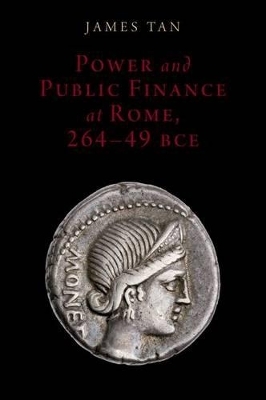
Power and Public Finance at Rome, 264-49 BCE
Seiten
2017
Oxford University Press Inc (Verlag)
978-0-19-063957-0 (ISBN)
Oxford University Press Inc (Verlag)
978-0-19-063957-0 (ISBN)
In the first study of fiscal sociology in the Roman Republic, James Tan argues that much of Roman politics was defined by changes in the fiscal system. Tan offers a new conception of the Roman Republic by showing that imperial profits freed the elite from dependence on citizen taxes.
Rome's wars delivered great wealth to the conquerors, but how did this affect politics and society on the home front? In Power and Public Finance at Rome, James Tan offers the first examination of the Roman Republic from the perspective of fiscal sociology and makes the case that no understanding of Roman history is complete without an appreciation of the role of economics in defining political interactions. Examining how imperial profits were distributed, Tan explores how imperial riches turned Roman public life on its head. Rome's lofty aristocrats had traditionally been constrained by their dependence on taxpayer money. They relied on the state to fund wars, and the state in turn relied on citizens' taxes to fuel the war machine. This fiscal chain bound the elite to taxpayer consent, but as the spoils of Empire flooded into Rome, leaders found that they could fund any policy they chose without relying on the support of the citizens who funded them. The influx of wealth meant that taxation at home was ended and citizens promptly lost what bargaining power they had enjoyed as a result of the state's reliance on their fiscal contributions. With their dependence on the taxpayers loosened, Rome's aristocratic leaders were free to craft a fiscal system which prioritized the enrichment of their own private estates and which devoted precious few resources to the provision of public goods. In six chapters on the nature of Rome's imperialist enrichment, on politics during the Punic Wars and on the all-important tribunates of the Gracchi, Tan offers new conceptions of Roman state creation, fiscal history, civic participation, aristocratic pre-eminence, and the eventual transition to autocracy.
Rome's wars delivered great wealth to the conquerors, but how did this affect politics and society on the home front? In Power and Public Finance at Rome, James Tan offers the first examination of the Roman Republic from the perspective of fiscal sociology and makes the case that no understanding of Roman history is complete without an appreciation of the role of economics in defining political interactions. Examining how imperial profits were distributed, Tan explores how imperial riches turned Roman public life on its head. Rome's lofty aristocrats had traditionally been constrained by their dependence on taxpayer money. They relied on the state to fund wars, and the state in turn relied on citizens' taxes to fuel the war machine. This fiscal chain bound the elite to taxpayer consent, but as the spoils of Empire flooded into Rome, leaders found that they could fund any policy they chose without relying on the support of the citizens who funded them. The influx of wealth meant that taxation at home was ended and citizens promptly lost what bargaining power they had enjoyed as a result of the state's reliance on their fiscal contributions. With their dependence on the taxpayers loosened, Rome's aristocratic leaders were free to craft a fiscal system which prioritized the enrichment of their own private estates and which devoted precious few resources to the provision of public goods. In six chapters on the nature of Rome's imperialist enrichment, on politics during the Punic Wars and on the all-important tribunates of the Gracchi, Tan offers new conceptions of Roman state creation, fiscal history, civic participation, aristocratic pre-eminence, and the eventual transition to autocracy.
James Tan studied ancient history at The University of Sydney and at Columbia University, and works mainly in the fields of Roman political and economic history. He was Visiting Professor of Classics at Union College in Schenectady NY, and is now Assistant Professor of History and Classics at Hofstra University in Hempstead NY.
Table of Contents:
- Preface
- Introduction
- The Argument
Part I
- Chapter One: Rich Rome, Poor State
- Chapter Two: The Use and Abuse of Tax Farming
- Chapter Three: Profiteering in the Provinces
Part II
- Chapter Four: The Power of Taxpayers in the First Punic War
- Chapter Five: The Plight of Taxpayers in the Second Punic War
- Chapter Six: The Death and Taxes of the Gracchi
- Conclusions
- Bibliography
- Index
| Erscheinungsdatum | 11.03.2017 |
|---|---|
| Reihe/Serie | Oxford Studies in Early Empires |
| Verlagsort | New York |
| Sprache | englisch |
| Maße | 157 x 236 mm |
| Gewicht | 476 g |
| Themenwelt | Geschichte ► Allgemeine Geschichte ► Vor- und Frühgeschichte |
| Geisteswissenschaften ► Geschichte ► Regional- / Ländergeschichte | |
| Recht / Steuern ► Steuern / Steuerrecht | |
| Wirtschaft ► Volkswirtschaftslehre ► Wirtschaftspolitik | |
| ISBN-10 | 0-19-063957-1 / 0190639571 |
| ISBN-13 | 978-0-19-063957-0 / 9780190639570 |
| Zustand | Neuware |
| Informationen gemäß Produktsicherheitsverordnung (GPSR) | |
| Haben Sie eine Frage zum Produkt? |
Mehr entdecken
aus dem Bereich
aus dem Bereich
Was Pompeji über uns erzählt
Buch | Hardcover (2023)
Propyläen (Verlag)
CHF 44,75
auf den Spuren der frühen Zivilisationen
Buch | Hardcover (2023)
C.H.Beck (Verlag)
CHF 27,95


